

Newswise is a collaborative resource for journalists launched in 1991. It gathers research news (Science, Medical, Life, Business and Marketplace news releases) into one virtual place. This allows journalists to use data management tools to access information from various research institutions. Newswise deliver the news in a digest form (such as the Newswise DailyWire). It goes to journalists via e-mail, so they can review it quickly to select the stories that interest them on Newswise Web site, where the articles are in a full-text searchable database.
Newswise Science Research News. COVID Vaccine Distribution Under New Management: Live Expert Panel For February 4, 2pm ET. CHARLOTTESVILLE, Va., Feb. 2, 2021 /PRNewswire/ -- Topic: Experts will discuss and take questions on COVID-19 vaccine distribution under the new Biden Administration.
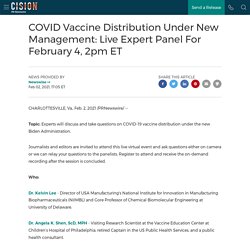
Journalists and editors are invited to attend this live virtual event and ask questions either on camera or we can relay your questions to the panelists. Register to attend and receive the on-demand recording after the session is concluded. Who: Dr. Dr. Dr. Coronavirus: Human strain causes fear, but domestic livestock strains are routine. Newswise — Many people are hearing about coronavirus for the first time as the China strain, COVID-19, affecting humans causes concern all across the world.
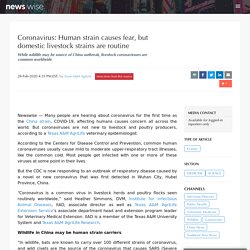
But coronaviruses are not new to livestock and poultry producers, according to a Texas A&M AgriLife veterinary epidemiologist. According to the Centers for Disease Control and Prevention, common human coronaviruses usually cause mild to moderate upper-respiratory tract illnesses, like the common cold. Probiotic Bacteria: A Double-Edged Sword. UIC opens three new health care simulation centers. Newswise — This fall, the University of Illinois at Chicago celebrates the opening of three health care simulation centers.
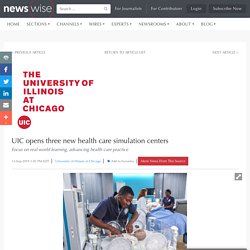
The facilities, which are run individually by the university’s College of Medicine, College of Nursing and College of Pharmacy, use specially trained actors, advanced and computerized manikins of all ages, and simulated environments to help students and health care professionals practice clinical skills, communication and decision-making skills, and get hands-on training in medical diagnosis, treatment and care.
Together, these spaces will facilitate more than 50,000 hours of hands-on learning for nearly 20,000 learners working or pursuing careers in the health sciences. The Simulation and Integrative Learning Institute Part of the College of Medicine, the Simulation and Integrative Learning Institute is a $23.5 million, 28,000-square-foot center located at 1220 S. Wood St., on UIC’s campus in the Illinois Medical District. M. View the fact sheet. Arthritis-Causing Virus Hides in Body for Months After Infection. Newswise — Since chikungunya virus emerged in the Americas in 2013, it has infected millions of people, causing fever, headache, rash, and muscle and joint pain.
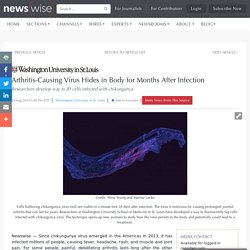
For some people, painful, debilitating arthritis lasts long after the other symptoms have resolved. Researchers have suspected that the virus or its genetic material – in this case, RNA – persist in the body undetected, but they have been unable to find its hiding places. Now, researchers at Washington University School of Medicine in St. Louis have figured out a way to detect cells infected with chikungunya virus that survive the infection. They genetically modified the virus such that it activated a fluorescent tag within cells during infection. Latest health & medical news article at Newswise. Electromagnetic fields may hinder spread of breast cancer cells. Newswise — COLUMBUS, Ohio — Electromagnetic fields might help prevent some breast cancers from spreading to other parts of the body, new research has found.

The study showed that low intensity electromagnetic fields hindered the mobility of specific breast cancer cells by preventing the formation of long, thin extensions at the edge of a migrating cancer cell. The research was done on cells in a lab, and the concept hasn’t yet been tested in animals or humans. The study was published today in the journal Communications Biology. at sun.awt.image.JPEGImageDecoder.produceImage(Unknown Source) “A cancer cell has a tendency to do the most destructive thing imaginable,” said Jonathan Song, lead author of the study. Free, Plow To Plate Meals Nourish Cancer Patient and Caregiver. Newswise — Diane and Phil Hannah started their lifelong journey together as neighbors who would talk to each other from their bedroom windows.
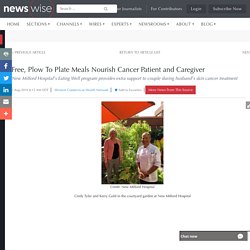
They were high school sweethearts before they married in 1952. They supported each other through 67 years of marriage, four sons, six grandchildren, five great grandchildren and most recently, Diane’s heart surgery and Phil’s skin cancer diagnosis. Reducing Skin-Related Side Effects of Targeted Cancer Therapies. When board-certified dermatologists help prepare patients for treatment, outcomes improve Newswise — NEW YORK (July 25, 2019) — While a new wave of drugs used in common cancer therapies are helping patients fight cancer, they also produce side effects that can affect patients’ hair, skin and nails.

These side effects can greatly impact patients’ quality of life and threaten their ability to continue treatment. “Approximately 50% of patients who undergo immunotherapy and receive targeted cancer medications experience a skin-related reaction to the medication,” says board-certified dermatologist Anisha Patel, MD, FAAD, an associate professor of dermatology and internal medicine at the University of Texas MD Anderson Cancer Center in Houston. "This can result in changes to their nails or to the skin on their hands and feet, making daily activities, such as wearing shoes or opening a jar, very painful.” Dr. To reduce the impact of these side effects, Dr. Dr. Contact. Untangling Hair Loss in Women. The right diagnosis is key for a successful treatment plan Newswise — NEW YORK (July 25, 2019) — Many people think of hair loss as a men’s issue, however hair loss is just as common in women as it is in men.
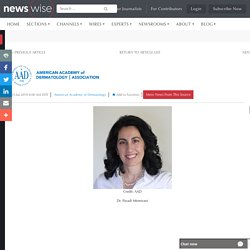
In addition to hereditary hair loss, the hairstyles and products that women use on their hair can contribute to hair loss. Fortunately in most cases, a board-certified dermatologist can identify the type of hair loss and develop an effective treatment plan. Molecular Sensor Scouts DNA Damage and Supervises Repair. Newswise — PITTSBURGH, July 22, 2019 – In the time it takes you to read this sentence, every cell in your body suffers some form of DNA damage.
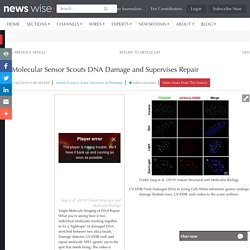
Without vigilant repair, cancer would run rampant, and now scientists at the University of Pittsburgh have gotten a glimpse of how one protein in particular keeps DNA damage in check. According to a study published today in Nature Structural and Molecular Biology, a protein called UV-DDB—which stands for ultraviolet-damaged DNA-binding—is useful beyond safeguarding against the sun. This new evidence points to UV-DDB being a scout for general DNA damage and an overseer of the molecular repair crew that fixes it. People Are More Likely to Try Drugs for the First Time During the Summer. New technique helps create more personalized therapies for people with hard-to-treat cancers.
Being able to identify targets for adoptive cell therapies is one of the first steps in developing personalized treatments for people with hard-to-treat cancers.
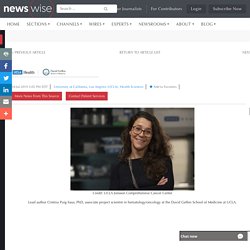
However, predicting whether a patient will have an immune response to a particular abnormal protein caused by mutations that serves as a new antigen (neoantigen), can be challenging. Using an ultra-sensitive and high-throughput isolation technology (termed imPACT Isolation Technology®) designed to isolate neoepitope specific T-cells, UCLA researchers were able to characterize and identify the neoantigens driving the antitumor responses in a patient treated with anti-PD-1 blockade and isolate the T cell receptors responsible for such effect. Using immune checkpoint inhibitors to treat people with metastatic melanoma has helped transform the way people with the most deadly skin cancer are treated. First Ever State Sepsis Regulation in U.S. Tied to Lower Death Rates. Newswise — PITTSBURGH, July 16, 2019 – Death rates from sepsis fell faster in New York than expected—and faster than in peer states—following the introduction of the nation’s first state-mandated sepsis regulation, according to an analysis led by University of Pittsburgh researchers and published today in JAMA.
The policy requires all New York hospitals to quickly implement certain protocols when the deadly condition is suspected. The finding is good news for the nearly dozen other states in varying stages of adopting similar policies to reduce deaths from sepsis, the leading cause of death in hospitalized patients. Fewer than half of U.S. adults exposed to court-ordered anti-smoking advertisements. Newswise — The tobacco industry’s court-ordered anti-smoking advertisements reached just 40.6% of U.S. adults and 50.5% of current smokers in 2018, according to new research from The University of Texas MD Anderson Cancer Center. Exposure to the advertisements was even lower among certain ethnic and socioeconomic subgroups historically targeted by tobacco industry marketing. The findings, published today in JAMA Network Open, should be considered when planning future anti-smoking ads to reach youth and at-risk populations, explained senior author Sanjay Shete, Ph.D., professor of Biostatistics and Epidemiology and deputy division head of Cancer Prevention & Population Sciences.
“When compared to other nationally funded anti-smoking campaigns, the reach and penetration of these industry-sponsored ads were suboptimal,” said Shete. Pre-Term Babies Are Less Likely to Form Romantic Relationships in Adulthood. - A study of up to 4.4m adult participants has shown that those who were born pre-term (under 37 weeks gestation) are less likely to form romantic relationships, have sexual relations or experience parenthood than those who were born full term - Research from the University of Warwick suggests it’s partly due to pre-term birth being associated with being more often withdrawn and shy, socially excluded and less likely to take risks in adolescence. New E-Cigarette Laws Could Drive Some Users to Smoke More Cigarettes. Newswise — DURHAM, N.C. -- Efforts by the FDA and some cities to limit the availability and appeal of e-cigarettes to young users could drive some existing users to smoke more tobacco cigarettes to get their fix, according to new research from Duke Health.
The findings, from a survey of 240 young U.S. adults who use both e-cigarettes and traditional tobacco cigarettes, are scheduled to be published July 15 in the journal Substance Use & Misuse. “The FDA now has regulatory authority over all tobacco products, including e-cigarettes and we know that some communities have taken action to ban flavored e-cigarette products,” said Lauren Pacek, Ph.D., the study’s lead author and an assistant professor in psychiatry and behavioral sciences at Duke. “We wanted to take a first pass at seeing what users’ anticipated responses to new regulations might be,” Pacek said. The survey was small and not designed to predict the behavior of e-cigarette users across the U.S., Pacek said. Adults With HIV Who Have Compassionate Care Providers Start and Remain in Treatment Longer. Adults with HIV are more likely to continue life-saving treatments if their primary health care providers show respect, unconditional empathy without judgement and demonstrate an ability to partner with patients in decision making to address their goals, a Rutgers study finds.
The systematic review appears in the Joanna Briggs Institute Database of Systematic Reviews and Implementation Reports. The findings showed that the complexity of the illness, treatment regimen and overall healthcare system frequently overwhelms the patient and fear of stigma often prevents them from beginning or continuing treatment. The researchers found that patients need help in understanding their illness and care needs using understandable language to translate complex information, letting patients know what to expect and reinforcing that HIV is now a treatable, yet complex, chronic illness.
“Today, HIV is considered a chronic, treatable condition. Full circle ─ rigorous study links moderate drinking in older age with lower risk of death ─ but more research still needed. Newswise — Alcohol consumption in later life has increased over the past decade. “Ouch, it stung me!” — Sting allergies can bee a real buzzkill. Newswise — BIRMINGHAM, Ala. – Summer is time for good fun in the sun. Moon landing’s legacy: a better life on Earth.
Moon landing’s legacy: a better life on Earth From LED lights to structural-analysis software, the U.S. space program paid dividends across society, says University of Georgia engineering professor Ben Davis. Older Adults Benefit from Community Food and Nutrition Programs. Regulation of Cancer Promoting Molecule EphB4 Offers Potential Treatment Target for Mesothelioma, Other Cancers. It's dog eat dog on the canine social ladder. Newswise — Climbing the social ladder is a ruff business for dogs, new research shows. Scientists find simple urine test could offer a non-invasive approach for diagnosis of IBS. First Complete Wiring Diagram of an Animal’s Nervous System.
Cardiac Genetic Mutation May Not Always Predict Heart Disease. Tip Sheet: HIV Exclusions in Clinical Trials; Lack of Diversity in Genetic Research; And Advances in Bladder Cancer. How You and Your Friends Can Play a Video Game Together Using Only Your Minds. High doses of 60-plus year-old chemotherapy drug found to spur immune system attack on lymphoma. Researchers teleport information within a diamond. Protein linked to aggressive skin cancer. How to Safely Get Rid of Unused Medications. Scientists Developing Way to Help Premature Babies Breathe Easier. Newly defined cancer driver is Fast, Furious and Loud.
New Target for Drug Intervention in Alzheimer’s Disease Identified. Baking Soda Boosts Immunity, Impairs Insulin Response in Type 2 Diabetes. Love and alcohol: Romantic relationships can influence genetic predispositions for alcohol problems. Low Rates of Tobacco Dependence Treatment in Patients Hospitalized with Substance Use Disorders. Marijuana and alcohol: recreational users drink more, medicinal users drink less. Solitary drinking among youth is influenced by social discomfort, especially for girls. Restrictive Approach to Blood Cell Transfusions Safe for Heart Surgery Patients. The Key to Unlock Bacterial Fusion. Low-carb diet may reduce diabetes risk independent of weight loss. Newswise: News for Journalists. Newswise: News for Journalists. Study: Marijuana use increases, shifts away from illegal market.
Exploiting RB1 Predictive Value for Cancer Therapy in the Clinical Setting: Lost in Translation. Heartburn drugs linked to fatal heart and kidney disease, stomach cancer. Are You Aware of the Pros and Cons of Alcohol?